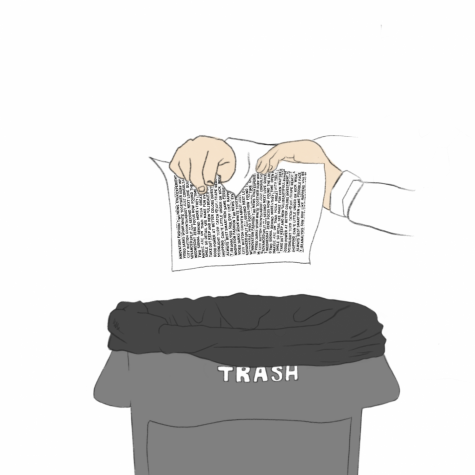Divided America: A room full of pouty babies
State of the Union speech reflects era of American hyperpartisanship
When have our honorable, level-headed politicians become tantrum-throwing babies? It seems that U.S. politics have shifted from respectful diplomacy to petty squabbling.
President Donald Trump’s third state of the union address occurred on Feb. 4; the night began and ended with extreme charges of partisanship.
House Speaker Nancy Pelosi first broke congressional tradition when introducing Trump as “the president of the United States,” leaving out the words “honor” and “privilege.” Trump then refused Pelosi’s outstretched hand after he handed her a copy of his transcript, deftly turning it away.

Quarrels and bickerings have no place in the State of the Union address.
After his speech, amid a standing ovation to Trump, Pelosi intentionally tore her copy of the address in half and discarded the pieces.
As Pelosi exited the congress, she told reporters: “It was the courteous thing to do, considering the alternative.” Yet, the “alternative” leaves an important question.
The Pelosi-Trump feud has been going on for a long time, beginning even before Trump’s impeachment trial.
Both incidents are emblematic of a larger problem in today’s high-stakes politics. Gone are the days of peaceful laying out debate points. In its stead are dramatic bouts of hyperpartisanship, which is a sharply polarized situation in which political parties are in fierce disagreement with each other.
The issue with hyperpartisanship is that it divides U.S. into two extremely partisan parties. According to the Washington Post, more than half of registered Democrats and Republicans view the other party “very unfavorably,” and 49 percent of Republicans and 33 percent of Democrats would rather not let their children marry someone from the opposite party.
Such an extreme polarization in America proves detrimental to democracy in itself. Instead of voting for what’s right or what the people want, political leaders resort to what their party wants. For instance, during the impeachment trial, there were eight states with one Democratic and one Republican representative. However, the Democrats voted to impeach Trump while all Republicans but Mitt Romney voted to acquit him even though both senators took an oath to represent the same people. This divide is seen even within states such as Montana, where Jon Tester (D) voted to impeach Trump while Steve Daines (R) voted to acquit him, according to Politico.
The separation of powers clause that the country was founded upon has shifted into a nation governed by a “separation of parties,” as each side schemes to control more of the government and elevate their power.
With the example Trump is setting, any future president will be allowed to abuse their power with the full support of their party. Whether or not Trump wins re-election, he has claimed that the transition of power will no longer be peaceful, reversing the long string of peaceful transfer of power since the 1800 election, when the Democratic-Republican Party won control of the Presidency and both houses of Congress under Thomas Jefferson.
According to Real Clear Politics, this transition of power between parties is an essential piece of democracy. It allows the next administration to begin their work quickly and struggle-free. Without it, the U.S. could be in danger of another civil war. Peaceful transition of power is a rare and hard-earned achievement; however, if the U.S. continues to grow more divided, parties may become reluctant to hand over their power, damning America.
To combat this, Americans should keep in mind that we are U.S. citizens firstmost, and then the parties will follow.











